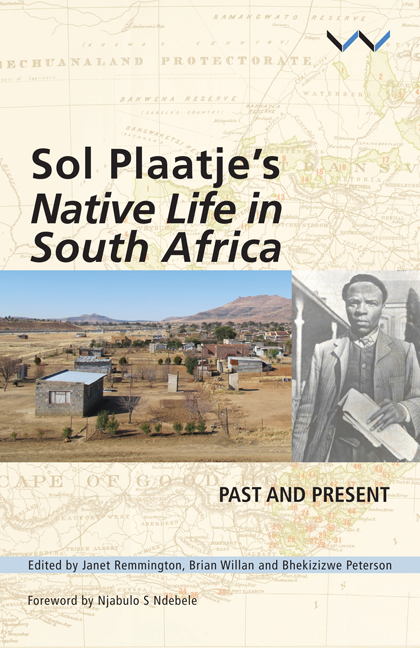Book contents
- Frontmatter
- Table of Contents
- Acknowledgements
- Foreword: Sol T Plaatje and the ‘power of all’
- Introduction: Native Life in South Africa – then and now
- Editions of Native Life in South Africa: 1916 to the present
- Looking Back: Foreword to Ravan Press edition of Native Life in South Africa, 1982
- Poetic Tributes
- What is in a name? In memory of Sol T Plaatje
- Segopoco Sa Moshui Sol T Plaatje
- In memory of the late Sol T Plaatje
- Lefatshe, nkometse
- Earth, swallow me
- Miscellaneous Frontmatter
- Chapter 1 Native Life in South Africa: Writing, publication, reception
- Chapter 2 Modernist at large: The aesthetics of Native Life in South Africa
- Chapter 3 The print world of the press and Native Life in South Africa
- Chapter 4 Going places: Native Life in South Africa and the politics of mobility
- Chapter 5 Native Life in South Africa and the world at war
- Chapter 6 African intellectual history, black cosmopolitanism and Native Life in South Africa
- Chapter 7 ‘Native Lives’ behind Native Life: Intellectual and political influences on the ANC and democratic South Africa
- Chapter 8 Whose past? Native Life in South Africa and historical writing
- Chapter 9 Women and society in Native Life in South Africa: Roles and ruptures
- Chapter 10 African progressivism, land and law: Re-reading Native Life in South Africa
- Chapter 11 Land and belonging: On the tomb ya ga Solomon Plaatje
- Chapter 12 Revisiting the landscapes of Native Life
- A Contemporary Reimagining: The Road to Dikhudung
- Contributors
- Plaatje Resources
- List of Figures
- Index
Chapter 9 - Women and society in Native Life in South Africa: Roles and ruptures
from Poetic Tributes
Published online by Cambridge University Press: 21 April 2018
- Frontmatter
- Table of Contents
- Acknowledgements
- Foreword: Sol T Plaatje and the ‘power of all’
- Introduction: Native Life in South Africa – then and now
- Editions of Native Life in South Africa: 1916 to the present
- Looking Back: Foreword to Ravan Press edition of Native Life in South Africa, 1982
- Poetic Tributes
- What is in a name? In memory of Sol T Plaatje
- Segopoco Sa Moshui Sol T Plaatje
- In memory of the late Sol T Plaatje
- Lefatshe, nkometse
- Earth, swallow me
- Miscellaneous Frontmatter
- Chapter 1 Native Life in South Africa: Writing, publication, reception
- Chapter 2 Modernist at large: The aesthetics of Native Life in South Africa
- Chapter 3 The print world of the press and Native Life in South Africa
- Chapter 4 Going places: Native Life in South Africa and the politics of mobility
- Chapter 5 Native Life in South Africa and the world at war
- Chapter 6 African intellectual history, black cosmopolitanism and Native Life in South Africa
- Chapter 7 ‘Native Lives’ behind Native Life: Intellectual and political influences on the ANC and democratic South Africa
- Chapter 8 Whose past? Native Life in South Africa and historical writing
- Chapter 9 Women and society in Native Life in South Africa: Roles and ruptures
- Chapter 10 African progressivism, land and law: Re-reading Native Life in South Africa
- Chapter 11 Land and belonging: On the tomb ya ga Solomon Plaatje
- Chapter 12 Revisiting the landscapes of Native Life
- A Contemporary Reimagining: The Road to Dikhudung
- Contributors
- Plaatje Resources
- List of Figures
- Index
Summary
Native Life in South Africa is replete with its author's views on the ‘proper’ role of women in society. Sometimes these are expressed as accounts of notable events in the period about which Sol Plaatje is writing, sometimes as references to personal circumstance, and sometimes as intellectual debt. This chapter is structured around the following themes: Plaatje's network of support during the writing of his book; his own family relationships and the light that they throw on connections between private and public life; and his wider perspective on women's emancipation. As will be seen, there is a racial divide cutting through the chapter, which partly reflects different geographic localities and partly the relative class positions of the women discussed. Of course, an attitude towards women's social roles implies a particular stance on gender relations and, while this chapter focuses on the former, it also addresses the implications for the latter.
An important point needs to be made at the outset about the nature of the evidence at one's disposal. In a society in which Africans were reduced to virtual serfdom, the record of their struggles to resist such degradation was not of great interest to established libraries and archives, except perhaps where they threatened the status quo. By the same token, the insecurity of Africans’ organisations (premises, finances) was not conducive to the long-term safeguarding of records. Thus, in an archive generally marked by absence or patchiness, the challenges of locating African women are immense. There are tantalising hints of correspondence that passed between protagonists but no extant letters of organisations that women founded and ran and whose papers have long vanished. This has skewed (and will likely continue to skew) the way in which African women's public roles, political thought and reach of influence are presented. Whatever the difficulties, however, it is important not to equate a lack of evidence with a lack of participation in debate and struggle.
‘Dear Mr Plaatje’: A network of support
Throughout his time in London, Plaatje was able to draw on the indispensable support of those who had welcomed the Congress delegation in mid-1914 – and, indeed, others before that. They were also to continue their support for him after his return to South Africa in 1917 and through his second visit in 1919.
- Type
- Chapter
- Information
- Sol Plaatje's Native Life in South AfricaPast and Present, pp. 158 - 174Publisher: Wits University PressPrint publication year: 2016



